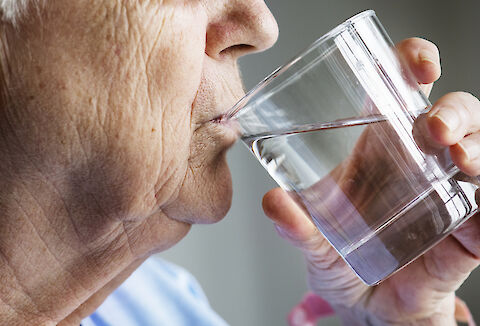
Spring has finally arrived, bringing with it Arizona heat and sunny skies, perfect for enjoying outdoor activities. Whether you're going for leisure strolls or tending to your blossoming garden, there's no denying the rejuvenating effect of spending time outdoors. However, as we embrace these spring activities, seniors need to take extra steps to stay hydrated.
Today's blog post is about the importance of hydration for older adults, helpful tips on maintaining proper fluid intake, and advice on recognizing signs of dehydration. So, grab your water bottle, and let's get started!
Special Considerations for Seniors
As we age, our bodies undergo various changes that impact how well we can regulate our ability to stay adequately hydrated. Unfortunately, this means that seniors are more susceptible to dehydration than younger individuals. Staying properly hydrated is critical for overall health, and the consequences of dehydration for seniors can be severe. Some potential risks include an increased likelihood of heat stroke, reduced cognitive function, a heightened risk of urinary tract infections, and even an increased risk of falls due to dizziness.
Tips for Staying Hydrated
It doesn't take much to create a viable hydration strategy. Here are three simple tips to get you started:
1. Know How Much You Need
Proper hydration begins with understanding how much water you should consume each day. According to the National Council on Aging, seniors should calculate one-third of their body weight, and drink that number of ounces of healthy fluids. For example, seniors who weigh 100 pounds, should set a daily goal of drinking 50 ounces of water.
Your doctor's opinion overrides any formula, and they will adjust this guideline according to factors such as medications you may be taking or pre-existing medical conditions.
2. Eat Juicy Food
Adding high-water-content snacks like fresh fruits and vegetables to your daily diet helps maintain proper hydration levels. Watermelon, cucumber, and oranges are excellent hydrating snacks. Don't forget that smoothies and soups can also help to increase your fluid intake.
3. Schedule Your Sips
When embarking on outdoor activities, particularly during spring and summer, have a hydration strategy in place. Carry a water bottle with you whenever possible and take regular water breaks, even if you don't feel thirsty. Thirst can sometimes be an unreliable indicator of dehydration, as the sensation becomes less noticeable as we age. Also, consider engaging in outdoor activities during the cooler times of the day, such as early morning or evening. Lastly, wear light, breathable clothing to help your body maintain a comfortable temperature.
Know the Signs of Dehydration
Awareness of the signs and symptoms of dehydration is essential for seniors, as it allows for prompt intervention to prevent more severe consequences. Some common indications of dehydration include a dry mouth and throat, dark yellow urine, fatigue, dizziness, and headaches. In more severe cases, dehydration can lead to confusion, rapid heartbeat, sunken eyes, and even fainting.
If you or a loved one experiences persistent symptoms of dehydration despite increasing fluid intake, consult a healthcare professional right away. Any time severe symptoms are present, promptly seek medical attention.
We Empower Independence
For seniors living in Tucson Southeast, Green Valley, Oro Valley, Rita Ranch, Vail, Sahuarita, and Marana, Senior Helpers Tucson is here to assist you in improving your quality of life and supporting your independence. Contact us today to learn more about our comprehensive senior care services and how we can assist you as you enjoy your favorite springtime activities.